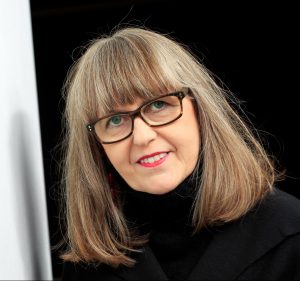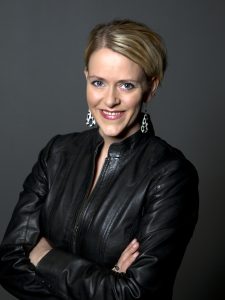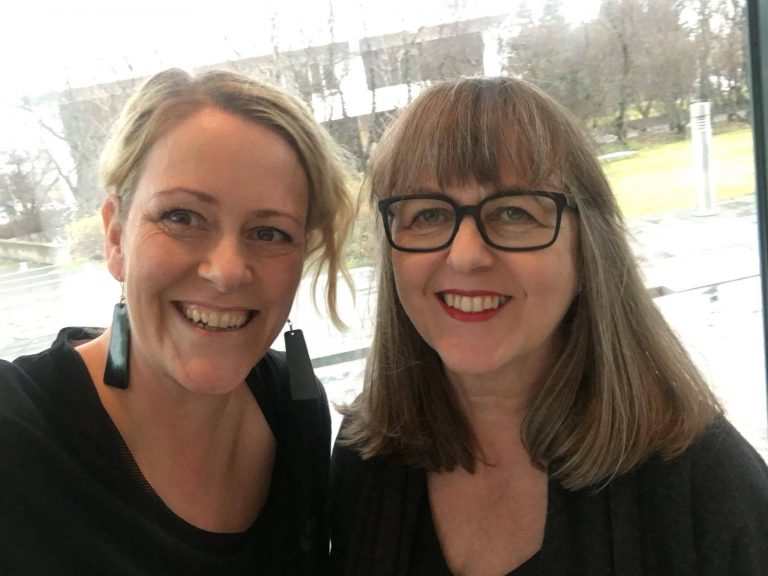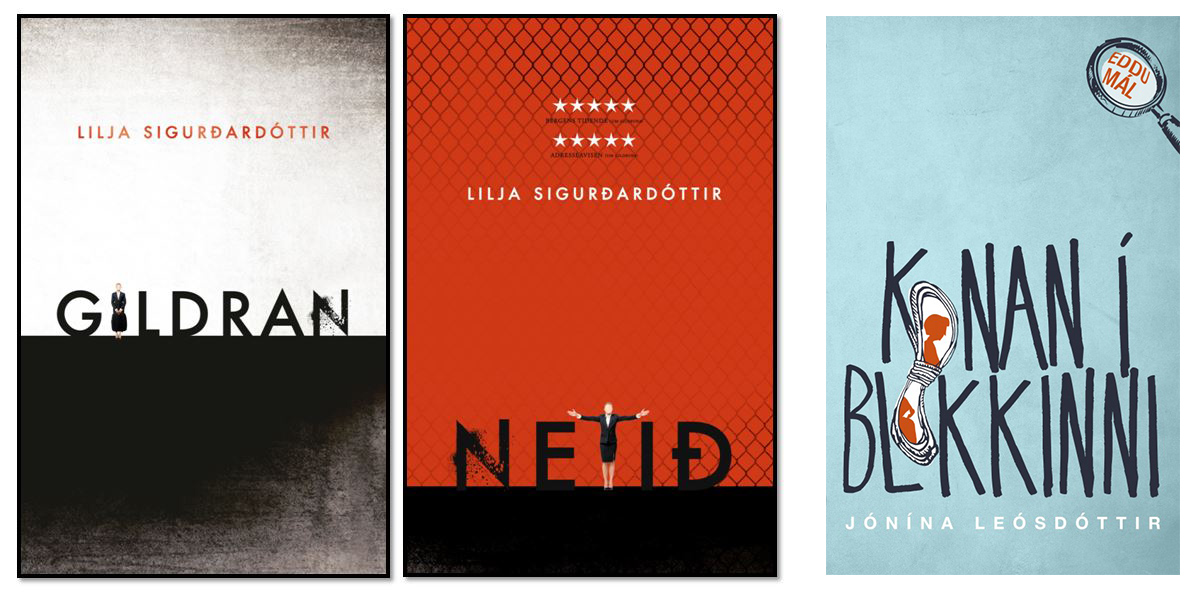The annual book flood is upon us and crime fiction as usually topping the bestseller lists. Two of our prominent female crime writers, Lilja Sigurðardóttir and Jónína Leósdóttir, are lesbians and GayIceland was curious to know if that is a crucial factor in their writing. We decide to meet to discuss this question in the café of the National Museum, the perfect setting for the perfect crime.

Jónína is late. When she arrives – red lipstick in place, cappuccino in hand – she looks at Lilja – who is telling me a joke – almost in despair. “How can you always be so cheerful? These are no times to be cheerful in.“ She sits, lets out a sigh and confesses that she has not slept all night worrying about the state of the world and the presidential elections in the USA which take place on the day of the interview. This dramatic entrance of course leads to discussion about the state of the world and the looming horrors in every corner. But are not crime writers contributing to the distribution of despair?
“Pff,“ Lilja laughs. “Murders and torture are fun, not despair. They cheer people up.“
Jónína is awaiting the second book in here crime series about Edda, the clever pensionist who refuses to sit quietly and wait for death and gets entangled in solving crimes, by accident of course. Lilja‘s second book about the lesbian pair Sonja and Agla, who are not so much solving crimes as committing them, is already out and climbing the bestseller charts. Why did they decide to make crimes their topic in their novels?
“It was kind of an accident,“ Jónína says. “I was writing a young adult book about depression and the danger of young people committing suicide and I had been searching for ten years for the right way to tell that story. Finally I came to the conclusion that it had to be a suspense novel, to grab the attention of the youngsters. I also knew that it had to be told in a comic way, even if the subject was dark, I could not write without using humor, and when I found this way to convey what I wanted to say the story clicked immediately. That‘s how I started writing mysteries.“
“Ian Rankin, the famous Scottish author, once said that women write extremely graphic crime novels and that the reason for that was … that most of them were man hating lesbians who enjoyed writing about torturing and killing men.“
“All my books are crime fiction,“ Lilja says. „I started writing the first one when a publisher advertised for crime stories and I thought ´why not´. That book was published and there was no turning back after that.“
Many of the most revered crime writers in history are women, why do Lilja og Jónína think that‘s the case? Are women more vicious than men?
“They write differently about crimes,“ Jónína says. “They are seldom writing about gunfights and car chases, the emphasis tends to be on the characters and their psychological problems.“
“I‘m actually writing action thrillers,“ Lilja says and pretends to be offended. “But it‘s an interesting question; why do so many women write crime fiction? Ian Rankin, the famous Scottish author, once said that women write extremely graphic crime novels and that the reason for that was, in his opinion that most of them were man hating lesbians who enjoyed writing about torturing and killing men. Val McDermid answered him and was not pleased with his mansplaining. She is a lesbian who writes graphic torture scenes, as a matter of fact, but that is not the norm in women‘s crime fiction. Women write all kinds of crime stories, obviously, and the victims are not exclusively men – far from it – so I don‘t know how Rankin could come to this conclusion.“
I do not contradict Lilja on this point but it is a bit noteworthy that in the small community of Icelandic crime writers, where only five women are prominent, there are two lesbians, Lilja and Jónína, does that tell us something?
“OMG! Maybe Ian is right,“ Lilja deadpans. “Maybe we lesbians are full of murderous rage! Of course in the history of literature and movies there is a lot of murderous lesbians, many of them bloodsucking vampires, so maybe we are trying to work against those prejudice – unconsciously.“
“It‘s such a pressure having to think about writing from this perspective,“ Jónína says. “Most writers are conscious of the responsibility they have to not present women as victims all the time, but being lesbian we have to take just as good care not to kill or torture men – that would be interpreted as man hating in our case – so we are left with the question: whom am I allowed to kill?“
“The trend in crime fiction these days is making children the victims,“ Lilja says. “The torture porn is declining, it‘s not exciting to torture women any more, so the emphasis has shifted to kids as victims in crime fiction. It‘s connected to the increased discussion of children as victims and all kinds of abuse in real life and it‘s a powerful tool in crime stories as almost every grown up person feels protective of children and get filled with horror at reading about them being abused.“

“I honestly think women writers are more worried about how they describe bad things happening to their characters,“ Jónína says. “I worry about not coming across as enough of a feminist if I let bad things happen to my female characters, for example.“
“You‘re far too decent and compassionate,“ Lilja interrupts and Jónína concedes, laughing. But I think we are on to something here; is it not frustrating and restricting for a writer to be always trying to be pc enough?
“I usually don‘t think about this while I‘m writing,“ Jónína explains. “Then I‘m just writing away. It‘s after the books are published that I start to worry what people think. I think it‘s a feminine worry, that you, as part of the female race, are responsible for not giving readers wrong ideas.“
“I know what you mean,“ Lilja says. “I would never make a queer character in my stories into some nasty, boring stereotype. I‘ve had enough of that kind of queer characters in books by other people. It‘s part of my responsibility as a queer writer to try to break these stereotypes and present queer characters as real people – like everyone else.“
“Dear Lord,“ Jónína sighs. “Now you‘ve got me worried about Victor, one of the gay characters in my novel. He might be read as a stereotypical gay person. I even have him knitting a sweater!“
“See!“ Lilja teases again. “You are obviously full of prejudice against gay people!“
“I have to let him do something really macho in the next book,“ Jónína exclaims. “This is a serious oversight.“
“I think queer writers feel the pressure of the demand for pc presentations of queer characters even more acutely than other writers … it is very frustrating that everyone and their grandmas have opinions on what kind of stories you are allowed to tell.“
All joking aside, do they feel it is important to represent queer people in their books? Is that a mission?
“I think queer writers feel the pressure of the demand for pc presentations of queer characters even more acutely than other writers,“ Lilja answers. “One does not want to be making more of these horrible stereotypes, there is far too much of them in literature. I want to create queer characters that I would have wanted to read about when I was younger. But then again it is very frustrating that everyone and their grandmas have opinions on what kind of stories you are allowed to tell. The first right of the writer should be to be able to write the stories he or she wants to tell. And I admit that it is a tricky business to write about our life as it is but at the same time be conscious of not feeding the prejudice against us.“
“It does not bother me that much,“ Jónína says. „I‘ve written five stories for young adults and there you have to be very conscious of your responsibility not to put wrong ideas in the head of the youngsters. So I‘m used to having to think a lot about how I‘m saying things and representing characters. You are free of that in fiction for adults.“
But how much does being a lesbian matter to them as writers? Does it matter at all?
“Yes, it does,“ Jónína says. “Even if things have changed enormously for the better for the LGBTIQ+ community I‘m always aware that there might come a backlash. Rights that have been gained can so easily be taken away again. I think it‘s our duty to remind others of the lives of queer people. We have to keep the acceptance of diversity alive.“
“Even if things have changed enormously for the better for the LGBTIQ+ community I‘m always aware that there might come a backlash. Rights that have been gained can so easily be taken away again.“
“I don‘t write about lesbians because I feel I have to,“ Lilja says. “I do it because I want to tell these stories. Queer people are a big part of my life so obviously I want to write about them in my books. Being a lesbian has been a big issue in my life and been a deciding factor in almost everything I‘ve done. I assume that will be the case while I‘m alive, so yes, it is a huge factor in my writing.“
“Now you‘re making me feel bad again,“ Jónína moans. “I feel like I too should make that statement. Being in love with a famous woman who could not acknowledge our relationship for fifteen years before we made it public has of course affected my life enormously. But I don‘t dwell on it at all. I just love my life in the here and now. I don‘t want to ruin it by thinking about the past. I‘m a lot of things, being a lesbian is one, but that does not decide who I am. I‘m just me.“
Main photo: Lilja Sigurðardóttir and Jónína Leósdóttir are in unison when it comes to the importance of queer writing – even if they don‘t go about it the same way. Both writers will be taking part in the Icelandic crime fiction festival, Iceland Noir, which begins today.



